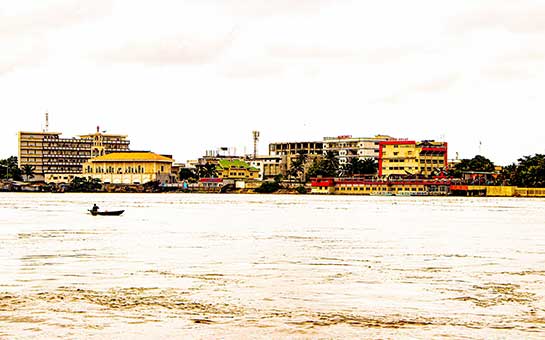Cotonou might not be the capital of Benin, but as its largest city, seat of government, and economic center, it's definitely a place you should visit. Once a small fishing village, Cotonou has since become an ever-expanding urban area that's a true showcase of West African life.
If you're planning a visit to Cotonou and Benin, it pays to be prepared for whatever situation you may encounter. Get travel medical insurance so you can enjoy a stress-free trip to Benin's largest population center.
Travel Medical Insurance for Travelers in Cotonou - FAQs
If an unexpected medical issue or accident were to occur during your trip to Cotonou, you'd want to make sure you had every resource at your disposal to get the best treatment possible. There's a chance that the medical facilities in Benin may not be up to the standards you're used to, so treatment at a private facility would be preferrable. In order to take advantage of private treatment without being solely responsible for a large medical bill, be sure to have travel medical insurance.
Do I need travel medical insurance for Cotonou?
Though you are allowed to visit Cotonou without travel medical insurance, it is not advisable. The facilities in the city may not be equipped to handle every sort of medical issue, so a serious condition could require emergency medical evacuation, which can be very expensive. Having proper insurance can allow you to concentrate on treatment and recovery, rather than a pile of large hospital bills.
Why buy travel medical insurance before traveling to Cotonou?
Medical emergencies come unannounced. You could be exploring the colorful streets of Cotonou one moment, and be stuck in a hospital bed minutes later. There is no way you can predict or avoid it. Whether it's a small issue like a sprained ankle, or a major illness or injury, the last thing you would want to be wondering about is the bills you'd have to handle. Travel medical insurance looks after the financial aspect of medical emergencies. With travel medical insurance, you just need to focus on recovery.
Cotonou's Most Popular Places for Travel
The Dantokpa Market
The Dantokpa Market is where you'll see the real Cotonou. The market is vast. Shop for spices, electronics, and woven baskets, among other things, and spend some time interacting with the locals, if you please. Try to visit it early in the morning or during the evening to avoid the scorching sun.
The Artisanal Center
What you won't find in the Dantokpa market, you'd find in The Artisanal Center - the souvenirs. The people here are friendly. But don't shy away from bargaining, or you'd be paying double for the gifts you get for your friends and family from Cotonou.
Fidjrosse Beach
Fidjrosse beach isn't the best place to swim. The ocean in this region is rough. But what you can do here is soak in the sun and have a lazy day. It is a local's favorite and will also give you ample opportunity to chitchat with your fellow beachgoers.
Foundation Zinsou
If you are looking for a cultural experience in Cotonou, Foundation Zinsou is where you can find what you seek. Art from contemporary African artists of the present and past can be seen right here.
Notre Dame des Apôtres Cathedral
The striking red-and-white striped exterior of Notre Dame des Apôtres Cathedral makes this an interesting stop for those interested in unique architecture or religious history. This hub of Catholicism in Cotonou certainly has a different aesthetic than your typical cathedral.
Key Guidelines for Travelers in Cotonou
Cotonou is generally considered safe to visit, but it never hurts to be cautious. Use the following guidelines to minimize your risks and maximize your enjoyment during your visit.
Petty theft
When exploring the bazaars and markets in Cotonou, it is your job to keep your valuables safe and out of public sight. Pickpockets are most likely to operate in these areas.
Weather concerns
West Africa can experience heavy rainfall, and Cotonou is no exception to that. Keep an eye on the local weather reports to make sure rain doesn't ruin your beach day.
Road safety
Bush taxis are good for exploring the city, but drivers can overcharge tourists. Haggle and quote a price half of what the driver asks for. Never leave your valuables inside a vehicle if they are visible from the outside.
Avoiding fraud
Be cautious while using ATMs and swiping your credit and debit cards in Cotonou. Fraudulent machines can attempt to record your information, so make sure not to swipe your card if the machine appears to have been tampered with in any way.
Tourist treatment
Cotonou does not receive an overwhelming number of tourists. As such, you may receive more attention than you expect from locals. They may ask for your telephone number, which you can politely decline. In most cases, they're simply trying to befriend you.
Before You Travel to Cotonou - Do This
- Get your yellow fever vaccine. Authorities may ask you for the yellow fever vaccination certificate even before checking your passport. Other recommended but not enforced vaccinations for your visit to Cotonou include hepatitis A and B, typhoid, meningitis, and rabies.
- Learn some French. Although there are more than 50 languages spoken in Benin, French is the official language. It's never a bad idea to know a few basic phrases, as you should not depend on locals knowing how to speak English.
- Buy insurance. Medical emergencies and travel mishaps can happen at any time. Get travel medical insurance so you can be prepared.
